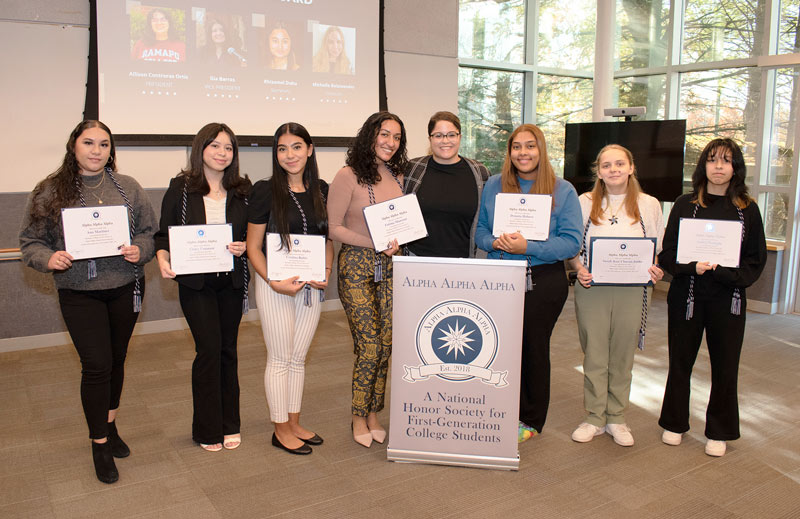College | Long Read
Ramapo On the Rise
Presidential Reflections on the College’s Growth
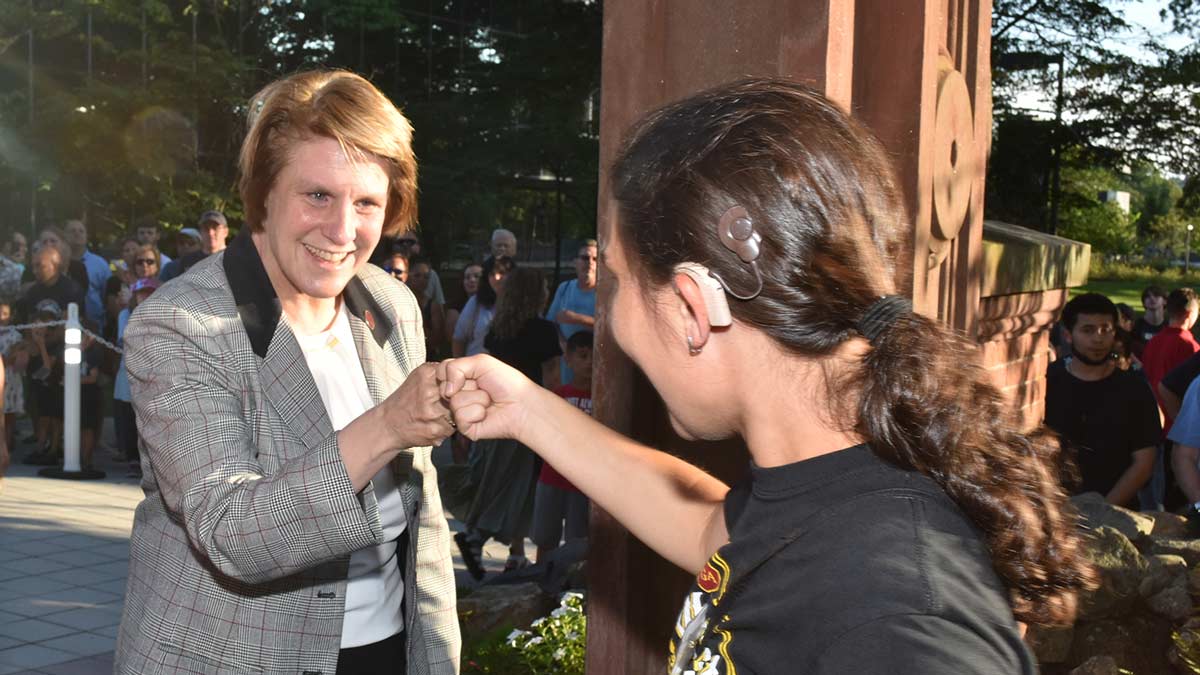
By Bev McCarron | Winter 2024
In her first year as president of Ramapo College, Cindy Jebb invited the community to submit ideas for a Ramapo Presidential Coin. Chosen by vote, the designs of Lauren Vandegrift ’23 and Miriam Sokolska ’22 are now featured on the coins which recognizes individuals who model Ramapo’s values, perform a job exceptionally well, or go above and beyond in the service of others. Drawing on a tradition she established in her previous role as Brigadier General and Dean, these special coins recognize when a job is done exceptionally well.
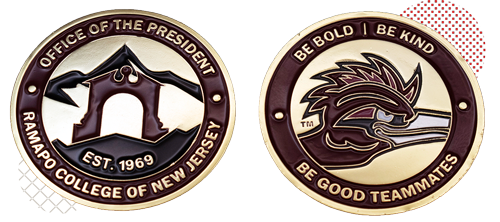
The Ramapo College Presidential Coin
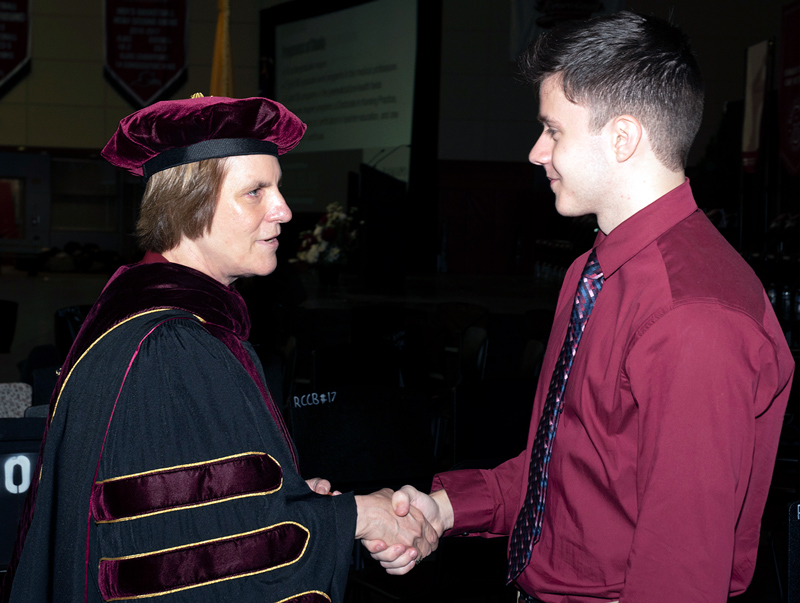
Jebb passes the Presidential Coin in a handshake.
At her State of the College address in February 2024, Jebb “coined” Professor of Political Science Dean Chen for organizing the region’s first Taiwan and Asia Program Conference sponsored by the Taipei Economic and Cultural Representative Office, Director of Admissions Anthony Dovi for leading the efforts that resulted in a record of over 8,000 applications and Assistant Director of the First-Generation Student Center Uma Mahalingham for helping to raise the College’s first-generation retention rate by almost 10%.
“If you see something wonderful, you acknowledge it on the spot. Most important is to acknowledge the values of the motto engraved on the Ramapo coin: ‘Be Bold, Be Kind, Be Good Teammates,’” said Jebb.
Jebb has incorporated other elements of military culture into her leadership style. She is intentional about fostering an environment where everyone feels they are part of a larger mission. She has built teams across campus and the greater community, and nowhere was that more evident than in the strategic planning process. “Teamwork is at the core of my values,” she said.
Jebb came to Ramapo at the tail end of the pandemic – a time when half of the students and even some of the newer faculty had never been on campus. She and other campus leaders recognized the need for community-building as a priority. They enlisted the expertise of well-known author Jim Collins, a researcher and expert in business management, to help her and her team create a strategic plan process that commenced barely four months after her arrival.
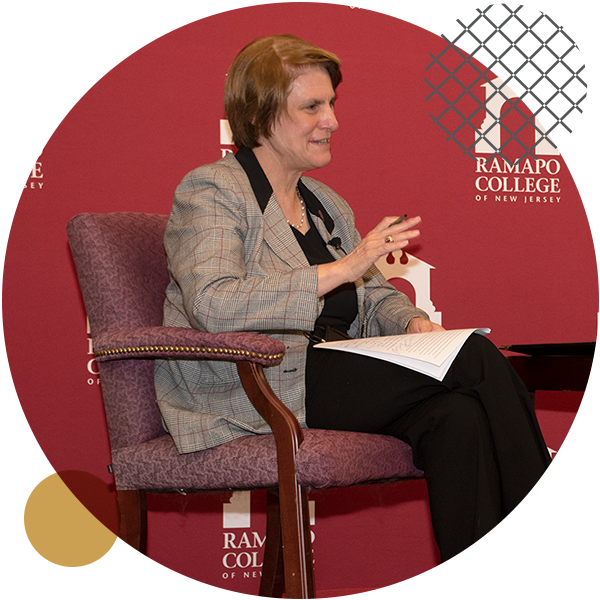
“It is really important that we make sure we know who we are and where we want to go. And where we want to go is a national distinction, ensuring we are delivering on our promise to our students.”
She gathered a range of faculty, staff and students for five, sharply-focused work sessions featuring outside speakers who encouraged the group to consider the future—of thought, of society, of learning, of the workforce—and to examine Ramapo’s readiness and resolve to meet the changing higher education landscape.
“We had disciplined discussions that reaffirmed our values and our mission, and we took on a different vision going forward,” she said. “It is really important that we make sure we know who we are and where we want to go. And where we want to go is a national distinction, ensuring we are delivering on our promise to our students.”
Entitled “Boldly Ascending,” the plan sets the course for Ramapo to prepare its students to thrive in a complex, global world as “the empathetic problem-solvers, ethical change agents and responsible leaders our world so desperately needs,” Jebb said.
The plan defines Ramapo as a student-focused, public liberal arts college and a community grounded in trust that prizes scholarship, mentorship and leadership, Jebb said. It outlines three key objectives: achieving academic excellence and student success; fostering an inclusive community; and creating agile stewardship.
Since its launch in July, all academic, operational and administrative units have detailed their contributions to the plan’s goals. For instance, Counseling Services recently outlined how it is advancing a culture of belonging by embracing diversity, access and accountability through a series of new measurable, multicultural wellness programs.
“Everyone has a responsibility to promote an inclusive community as one of our three key goals. It’s not siloed in our diversity, equity and inclusion office,” Jebb said. “We’ve been setting the conditions for an all-hands-on-deck culture, and having that kind of mindset prominent across campus is very powerful.”
Under Jebb’s tenure, Ramapo College has seen positive trends in enrollment and retention and fostered a stronger, more cohesive community.
The fall 2023 incoming student class is the second largest and most diverse in Ramapo’s history, with 46 percent of the population identifying as first-generation students. Jebb and her team approved the creation of a campus-wide proposal to create a First-Generation Student Center to support students academically and help cultivate a sense of belonging. The center has attracted grants and philanthropic support.
Over the last two years, the college has introduced a presidential speaker series on campus which has attracted notables such as the former CEO of Johnson & Johnson Alex Gorsky and the former CEO of SUEZ North America Nadine Leslie, as well as former United Nations advisor Azza Karam. Jebb also welcomed Jack Jacobs, retired colonel in the United States Army and Medal of Honor recipient to speak to the College on the anniversary of 9/11. While the speaker series are large forums open to the campus, there are also more intimate roundtable discussions. Students in the Data Science and Computer Science clubs, for example, enjoyed a private audience with Sharp Imaging CEO Mike Marusic.
“These first-hand experiential opportunities for our students are game-changers,” Jebb said. “Not only do our students learn and grow from dialogues with industry leaders, but our special guests get to engage with our curious, bright and talented students.”
This past year, the college secured significant capital and educational grants, including one for nearly $32 million from the state to renovate Linden Hall, a former residence hall, into a hub for student-centered well-being, providing health and safety services. Another $1 million grant from the state will expand the college’s highly successful nursing program at a time of workforce shortages. In addition, private philanthropy to Ramapo and alumni engagement are increasing.
Ramapo students are also submitting applications for prestigious awards and fellowships such as the Rhodes, Marshall and Truman scholarships – a tangible outcome, Jebb said, of the college’s prioritization of faculty-student mentorships and the integration of academic and student leadership programs.
“We are all very excited that we’re seeing an upward trajectory in all the things that matter,” she said.
One of the school’s proudest accomplishments may seem unlikely to be on a college president’s radar.
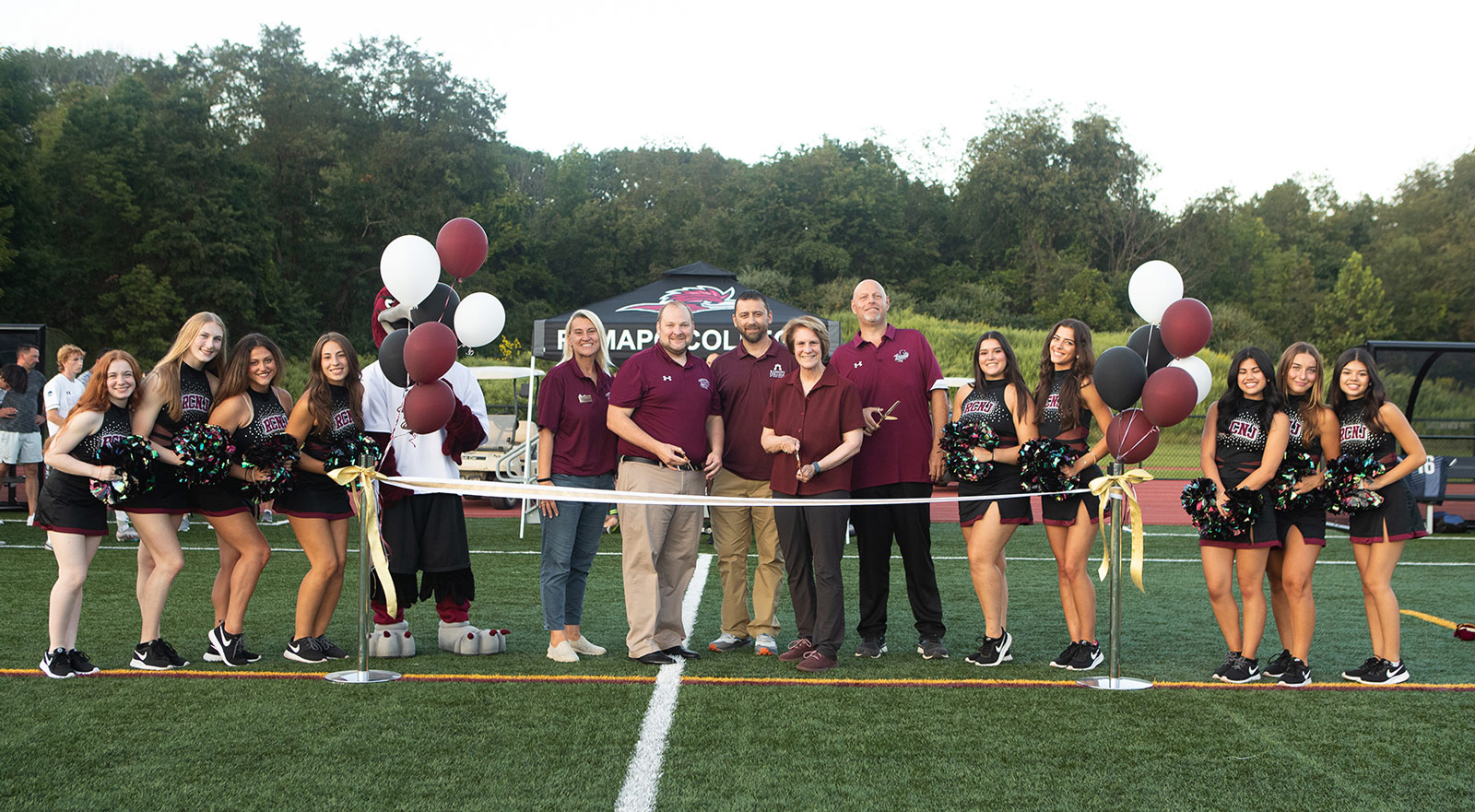
President Jebb (center right) with administrators and cheerleaders cut the ribbon on the new athletic field lights.
For the first time in its history, Ramapo has a lighted field and track turf. The Roadrunners’ inaugural game under the lights drew over 1,000 spectators who packed the stands and stayed until the end to cheer on the soccer team.
What Jebb saw was a community uniting and showing its school spirit. “As with all of our initiatives, it is about supporting students and working together to set the conditions for their growth and success,” Jebb said.

